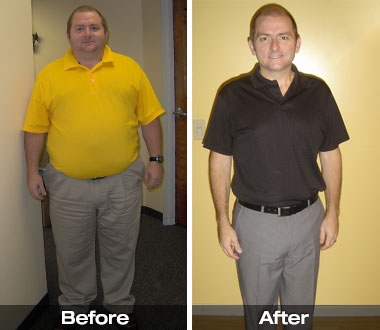Bach, 40, was a classic yo-yo dieter for years. After putting on weight as a teenager, his size fluctuated widely, topping 300 pounds at times. Occasionally he would start a new diet program and see quick results, losing up to 60 pounds. But the pounds always snuck back.
“As soon as I stopped the program, I gained it back,” said Bach, a customer service supervisor in the automotive lift industry from Madison. “They were almost like crash diets.”
With a history of diabetes and heart disease in his family, Bach felt like “a walking time bomb.” He struggled to participate fully in family activities with his wife, Kim, and daughter and son. Climbing more than just a few stairs left him panting, finding clothes that fit was a misery and airline flights were always accompanied by anxiety about fitting into his seat.
Bach also suffered from acid reflux and loud snoring at night.
The sort of person who investigates things thoroughly before jumping in, Bach extensively researched bariatric surgery. He had attended a presentation in Louisville, Ky., several years ago, but was doubtful about lap band surgery, convinced he could “trick it” through liquid intake, etc.
When he heard about vertical sleeve gastrectomy, he immediately sensed it was the right choice for him. His investigations led him to the Weight Loss Institute of Columbus Regional Health. After studying the website extensively, looking at YouTube testimonials by previous patients and other research, he attended an information session in Columbus.
Bach said he felt the staff at the Weight Loss Institute prepared him very well for what he could expect, both pre-op and in the days and weeks following surgery.
The night before the procedure, a nagging question suddenly struck him: what if you feel hungry but aren’t able to eat, which Bach says “for a fat person is like suffocating?” The staff got back to him early the next morning and completely allayed his concerns.
The results speak for themselves. Since having the vertical sleeve surgery on April 26, 2012, Bach has lost 104 pounds. He’s currently at 193 pounds and plans to lose 10 to 15 more. Side effects have been minimal.
One of his goals has been to get his BMI under 30, the threshold of what is generally considered obese. Aside from the obvious health benefits, lowering his body index rating also means he won’t have to pay a higher rate for his employer-provided health benefits — a phenomenon that’s becoming more and more common in the job market.
Bach’s snoring and acid reflux are things of the past. He actually enjoys shopping for clothes now, and his interaction with his family is more vigorous. Recently he ran a 5k race, leaving other family members in the dust.
“I can work on being me instead of working on thinking about how big I am all the time,” Bach said.
The response from friends, relatives and co-workers has been tremendous. And Bach doesn’t hesitate to tell them all about his bariatric surgery and how it’s helped him dramatically improve his quality of life.
“People don’t even recognize you. They ask questions, and I’m not shy about saying I had the surgery,” he said. “Some people might be embarrassed, but I’m not.”

